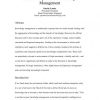Free Online Productivity Tools
i2Speak
i2Symbol
i2OCR
iTex2Img
iWeb2Print
iWeb2Shot
i2Type
iPdf2Split
iPdf2Merge
i2Bopomofo
i2Arabic
i2Style
i2Image
i2PDF
iLatex2Rtf
Sci2ools
JIKM
2002
2002
Ignorance Management: the Lessons of Small Enterprises for Knowledge Management
Knowledge management as traditionally espoused has two main strands: dealing with the aggregation of knowledge and the transfer of knowledge. However this official discourse and its key concepts grew out of the experience of large, mature, highly structured and dispersed enterprises. Looking at the environment in which small enterprises work suggests a different set of key concepts, looking at the notions of experience and structural capital as key knowledge manipulation tools. These tools are particularly relevant to environments of high uncertainty, volatility and risk
| Added | 22 Dec 2010 |
| Updated | 22 Dec 2010 |
| Type | Journal |
| Year | 2002 |
| Where | JIKM |
| Authors | Patrick Lambe |
Comments (0)

